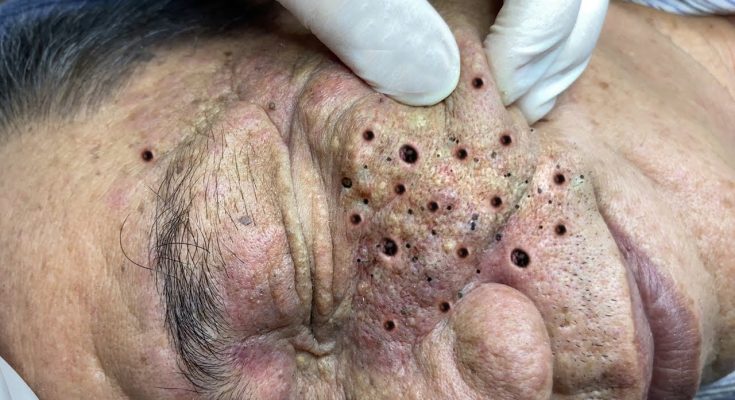Severe pimple outbreaks, like the one shown in the image, can be challenging to manage and treat. They can significantly impact one’s self-esteem and comfort. However, with the right approach, these outbreaks can be effectively managed and treated. Here are some key strategies for treating severe pimples.
1. Consult a Dermatologist
For severe outbreaks, it is crucial to seek professional help. A dermatologist can provide a thorough evaluation and recommend treatments such as prescription medications, topical treatments, or even procedures like chemical peels or laser therapy.
2. Use Medicated Cleansers
Using a medicated cleanser containing ingredients like benzoyl peroxide or salicylic acid can help reduce the severity of the outbreak. These cleansers work by killing bacteria and promoting the shedding of dead skin cells.
3. Avoid Picking or Squeezing
As tempting as it may be, avoid picking or squeezing pimples. This can lead to further inflammation, infection, and scarring. Instead, use targeted treatments to reduce the pimples.
4. Apply Topical Treatments
Topical treatments containing retinoids, antibiotics, or benzoyl peroxide can help manage severe pimples. Retinoids help unclog pores, while antibiotics reduce bacteria and inflammation. Benzoyl peroxide also kills bacteria and helps dry out excess oil.
5. Maintain a Skincare Routine
Consistency is key in managing severe pimples. Establish a daily skincare routine that includes cleansing, treating, and moisturizing. Use non-comedogenic products to avoid clogging pores.
6. Watch Your Diet
Diet can play a role in skin health. Avoid excessive consumption of sugary and greasy foods, which can exacerbate acne. Instead, focus on a balanced diet rich in fruits, vegetables, and whole grains.
7. Stay Hydrated
Drinking plenty of water helps keep your skin hydrated and can flush out toxins from your body. Aim for at least eight glasses of water a day.
8. Manage Stress
Stress can worsen acne. Engage in stress-reducing activities like yoga, meditation, or regular exercise. Ensuring adequate sleep each night is also essential for skin health.
9. Follow Up with Your Dermatologist
Regular follow-ups with your dermatologist can help monitor your progress and adjust treatments as needed. This ensures that you are on the right track and can make changes if the current regimen isn’t working.
Managing severe pimple outbreaks requires a comprehensive approach that includes professional medical advice, a consistent skincare routine, and healthy lifestyle choices. By following these strategies, you can effectively reduce and manage severe pimples, leading to clearer and healthier skin.
If you need personalized advice or have specific concerns about your skin, consulting a dermatologist is always the best course of action.



